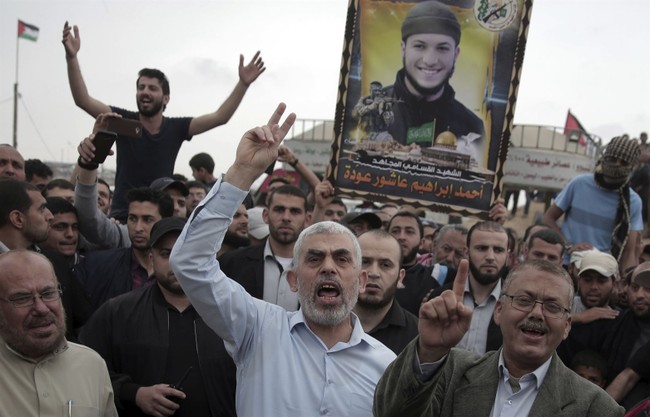
Yahya Sinwar, the mastermind of the October 7 attacks on Israel, has been selected as Hamas’ new leader, days after Israel allegedly assassinated his predecessor, Ismail Haniyeh, in Tehran.
Israel has not confirmed or denied responsibility for the assassination of Haniyeh, who had lived in exile in Qatar since 2019.
Hamas’ announcement of Sinwar’s elevation on August 7 is seen as a sign of defiance from the Palestinian terrorist group as tensions heat up in the region between Iran and Israel. and their supporters.
Fears of escalation into a wider conflict have soared since the killing of Haniyah, as Tehran vowed revenge against Israel over the recent assassination.
Hezbollah has threatened attacks on Israel from Lebanon after the Israelis recently took out one of its top commanders in an airstrike in Beirut.
Iran and Hezbollah, which are Hamas’ top allies, have issued statements in support for Sinwar’s appointment.
As the top leader of Hamas in Gaza, Sinwar is accused of being the architect of the October 7 attack, which led to the deaths of over 1,200 civilians and military personnel in Israel, along with over 250 hostages being taken.
An untold number of Palestinian civilians, ranging in the tens of thousands, have since been killed, with millions displaced in the wake of the Israeli ground offensive into Gaza.
Sinwar is currently believed to be hiding in one of the underground tunnels in the Gaza Strip and remains one of the main targets of Tel Aviv’s military operations in the region.
The Hamas chief is the last of the group’s major leaders after the Israeli Defense Forces assassinated Haniyeh, his deputy, Salah al-Arouri, and the organization’s senior military commander, Mohammed Deif.
Hamas spokesman Osama Hamdan told Al-Jazeera in an interview that Sinwar was voted in by consensus and that he still would continue the cease-fire and hostage negotiations with Israel.
“The problem in negotiations is not the change in Hamas,” said Hamdan, who blamed Israel and the United States for the failure to reach an agreement for the end of hostilities.
Hamdan stated that Sinwar’s selection as Hamas’s new leader is a sign that the group’s will to continue the fight remains unbroken and will remain “steadfast in the battlefield and in politics.”
“The person leading today is the one who led the fighting for more than 305 days and is still steadfast in the field,” he added.
The Hamas spokesman said that the group’s negotiations team, led by Haniyeh’s deputy Khalil al-Haya, would remain the same and that their new leader has been part of the discussions with Israel since the beginning.
Khaled Kaddoumi, Hamas’ representative in Iran, told the Associated Press that Sinwar was the “consensus choice” among all the group’s factions.
He said that their new leader understood the Palestinians’ political wish for an independent state and the right of return for refugees but is at the same time a “fierce fighter on the battlefield.”
Mediators from the United States, Egypt, and Qatar have been pushing an outline for a deal between the two sides, but negotiations have stalled, particularly over the release of the remaining hostages held by Hamas in exchange for a full withdrawal of Israeli troops from Gaza.
Hamas’ negotiation team has demanded guarantees from the Israelis that an initial ceasefire will continue until terms for prisoner exchanges are worked out.
The mediators have said that the killing of Haniyeh disrupted their efforts and are now trying to salvage the deal for a cease-fire and the release of hostages.
Meanwhile, the Israeli government is threatening to resume its offensive to destroy Hamas after the initial release of some of the hostages.
Secretary of State Antony Blinken told reporters at an August 7 press conference that Sinwar is Hamas’ main decision-maker in negotiations.
“It’s on him. It is a decisive point,” said Blinken, adding that Israel and Hamas need to avoid any further aggressive actions that would prevent a deal and continue to focus on negotiations “without delays and without excuses. It is time to focus on getting to yes.”
Blinken said that all sides need to take steps to not increase tensions further while asking the Iranians and the Israelis to de-escalate hostilities.
The same day, President Joe Biden spoke with the leaders of Egypt and Qatar and asked them to help end the escalating conflict as quickly as possible, the White House said in a statement.







